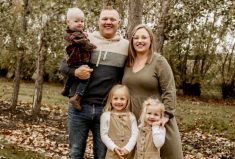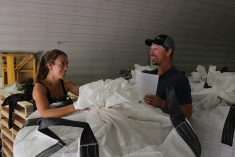It is a challenge to pass the farm to the next generation and while there are many resources for the older generation, there are relatively few to guide young farmers.
Farm family coach Elaine Froese has advice.
“I think founders are wanting their successors to prove themselves so I often ask young farmers what they are doing to prove their passion and commitment to keeping the farm viable and profitable going forward,” said Froese, who also farms in Manitoba.
Read Also

AAFC organic research program cut
Canada’s organic sector says the loss of a federal organic research program at Swift Current, Sask., will set the industry back.
Start by identifying your skill set and passion, she said. The key to that is knowing why you want to farm and being able to clearly explain why it’s important to you.
Identifying values is another crucial exercise for young farmers, including how they rank teamwork versus independence, said Froese.
[VIDEO] The dawn of a new generation: celebrating Canada’s farming future
“Are they willing to work in tandem with the founder or do they want a sub-enterprise that they can call their own?”
Some farmers start by running a custom operation under the umbrella of the larger business as a way to gain experience and prove their commitment.
There’s also the personal side because the next generation of farmers values having a life outside of work, she added.
“They want to have time with their family and they want to stay married, so they will not work 100-hour weeks like they’ve watched their parents do,” said Froese.
As with many tough issues, this requires effective communication about reasonable expectations. In other words, the younger generation must be able to explain why they value time away from work, even though there may be judgment from their family.
Froese also urges young farmers to see a financial planner to discuss their personal wealth as soon as possible.
By developing lifestyle and debt servicing plans — and getting a will and life insurance in place at a young age — they will be more comfortable knowing what their business plan is going to cost when it is time to see an agricultural lender.
In a situation where the older generation is not open to discussing transition, Froese recommends young farmers try to find out if the older generation is worried that the succession process may bring them into conflict.
She suggests asking a question such as, ‘I’m just curious why it is so hard for you to come to a family meeting. Is it fear of conflict?’
If the answer is yes, hire an objective, trained third-party facilitator, she said, adding there’s no reason a family can’t have an effective meeting with a facilitator in any location over Zoom.
She also encourages the use of ‘I think,’ ‘I need’ and ‘I want’ statements to express emotions. For young farmers trying to start the transition discussion, this could sound like: ‘I think it’s time we have a facilitated family meeting. I need to have certainty about my future. I want you, as my mom and dad, to be protected.’
Frustrated young farmers can also write a letter of intent to their parents to explain their thoughts and feelings and ask them to consider a facilitated family meeting, she said.
“Being clear is kind,” she said. “You get the behaviour you accept.”















